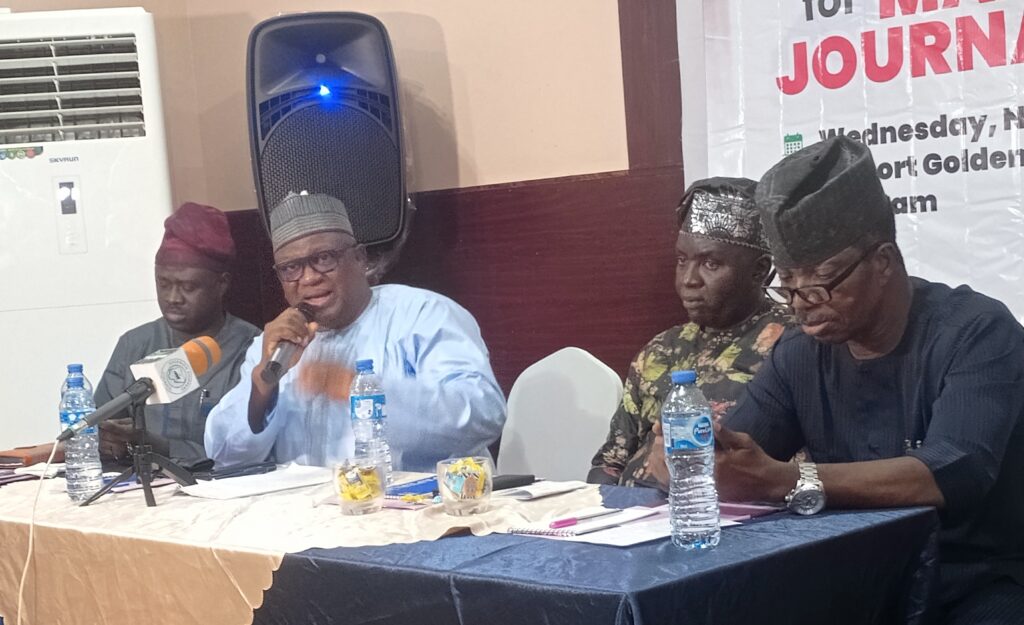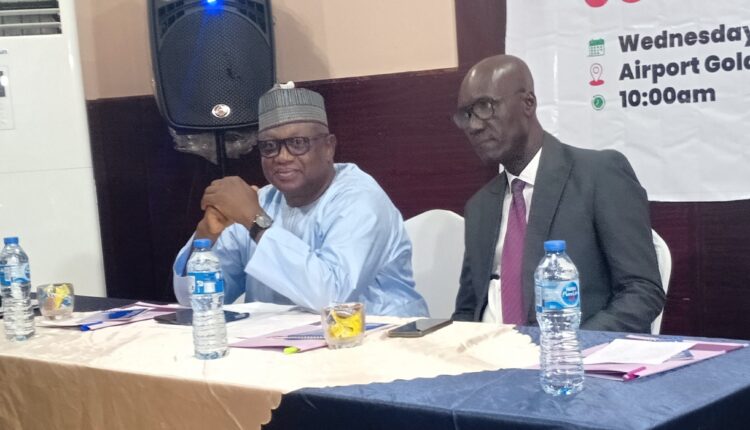CPPE Knocks National Bureau Of Statistics Over Poor Data Analysis On Maritime Activities
...As Shippers Council Decries Poor low technological advancement In port operations
By Roland Ekama
Worried about limited materials to evaluate the Marine and Blue Economy sub sector of the nation’s shipping industry, the Centre for Promotion of Private Enterprises (CPPE) has again lampooned the National Bureau of Statistics (NBS) over failure to reel out the much needed informative analysis and data on operational activities from the maritime industry.
CPPE further knocked the NBS for failing to give detailed and informative statistics about the maritime industry mostly as it affects local content and indigenous operators’ performance.
Speaking at the 2024 annual seminar for maritime journalists held in Lagos, Chief Executive Officer, Centre for the Promotion of Private Enterprise, CPPE Dr Muda Yusuf lamented that there is no significant record available for maritime activities by the NBS, adding that the bureau has failed to give update information about the industry.
Yusuf a former President Lagos Chamber of Commerce and Industry (LCCI), called on NBS to beam searchlight on the maritime industry because of the sector ‘s contributions to Gross Domestic Products (GDP).
According to him, the data on the maritime sector reflecting its contribution to the GDP in the quarter under review does not appear to have accurately reflected the sector’s performance, hence the charge to the Bureau to do more in its data analysis of the sector.
He further decried foreign dominance in the maritime sector stressing that the cabbage act has failed to protect local content.
He reiterated that no country in the world would allow foreign dominance in its operations.
Yusuf groaned that indigenous operators cannot be perceived as spectators in the nation’s maritime industry, lamenting further that sub sectors- freight forwarding,shipping, terminal operations, logistics are basically dominated by foreigners.

Earlier, the Executive Secretary , Nigerian Shippers Council (NSC), Pius Akutah, lamented that the industry is faced with some challenges pointing out that the adoption of modern technology in port operations is still very low.
The Council boss who was represented by the agency’s Director of Special Duties, Mustapha Zubairu , while highlighting the challenges noted that: “High tariffs, port charges, and inefficiencies at the ports increase the cost of doing business in Nigeria. While the NSC is responsible for overseeing tariff structures and pricing, it faces the challenge of balancing the interests of port operators, shippers, and the government while trying to make the ports competitive.
“The Federal Government made the Nigerian Shippers’ Council the Nigerian port economic regulator in 2015, but this status needed to be formalized through legislation.
“Therefore, the need for a strong legal framework for the Council as the nation’s port economic regulator is required.
“There is an urgent need for the passage of the Nigerian Shipping and Port Economic Regulatory Agency Bill 2023 which seeks to repeal the Nigerian Shippers’ Council Act and establish a regulatory agency for the Nigerian ports.
“In the area of infrastructure deficiencies, Nigerian ports are plagued by poor infrastructure, including outdated cargo handling equipment, inadequate road networks, and insufficient storage facilities.
“While the NSC can regulate economic activities, it has limited control over the physical infrastructure, which is largely under the purview of other government regulatory agencies.
- Advertisement -
“The NSC’s ability to drive reforms and improve port operations is therefore constrained by the broader infrastructural deficiencies within the port system.”
In the area of collaboration, the NSC Executive Secretary stated, “Effective port regulation requires close coordination between the NSC, the NPA, customs, terminal operators, shipping companies, and other stakeholders.
“However, there is often a lack of synchronization among these entities, leading to inefficiencies, conflicting policies, and a fragmented regulatory environment. There is a need to foster better collaboration and communication between all stakeholders to ensure smoother port operations.
“Reducing costs for importers and exporters while ensuring sustainable revenue generation for port authorities remains a delicate balancing act.
“Nigerian ports continue to struggle with congestion and inefficiency, despite efforts to streamline operations. Although the NSC is not directly responsible for managing traffic, it is charged with improving port competitiveness, which includes addressing delays, demurrage charges, and other inefficiencies that arise from congestion.
“The Council is working closely with terminal operators and other agencies to mitigate these issues.”
“The adoption of modern technology in port operations is still relatively low, hindering operational efficiency and transparency. The NSC is tasked with promoting the digitalisation of port processes, but challenges such as inadequate internet infrastructure, resistance to change among stakeholders, and a lack of skilled personnel in the tech field hamper progress in this area.
“Security challenges, including cargo theft, piracy, and general lawlessness, persist at Nigerian ports. These security risks negatively affect port operations and increase the cost of shipping.
“Additionally, corruption among port officials and stakeholders remains a problem, with illegal fees, bribery, and rent-seeking behaviour complicating the NSC’s regulatory functions and undermining reforms,” Akutah explained.
Thee convened of the seminar and Chief Executive Officer of First Medicaon Network Limited, Mr. Sesan Onileimo disclosed that the theme of the event ‘The Nigerian Shippers’ Council in Transition: Issues, Prospects, Challenges’ was deliberately chosen to offer a dual opportunity for maritime journalists and content owners to acquire knowledge about the emerging dispensation at the NSC.
Sesan Onileimo said, “When the idea of a gathering that will be specifically convened for maritime journalists for this purpose, was first mooted about 9 years ago, it sounded very nice. Essentially because there had been no such thoughts in the past. And if there were, they were never activated.
“Today, we remember with deep appreciation, the then Executive Secretary of the Nigerian Shippers’ Council; Hassan Bello and his Management, for believing in the need for capacity building and manpower development for maritime journalists.
“I recall with happiness, that my organisation had to defend the proposal. It was approved, and since then “The Annual Seminar for Maritime Journalists” has been warehoused in the NSC. And I have been the facilitator.
“It is noteworthy that the ‘Annual Seminar for Maritime Journalists’ has become one of the Key Performance Indicators (KPI) of the PR Department of the NSC, as an organisation. We are deeply grateful to successive heads of the PR Department of the Council.
“So, every year, in the last nine years, we gather like this to deliberate on a particular issue that is central or germane to the Nigerian maritime industry.
“This year, we deliberately narrowed down our focus to a topic that can offer a dual opportunity for maritime journalists and content owners to acquire knowledge about the emerging dispensation at the NSC, and also understand the apprehension of direct stakeholders about The Nigerian Shipping and Port Economic Regulatory Agency Bill 2023, which is in the last stage of being enacted.
“We commend the determination of the Management of the NSC for giving the Bill all that is required to come to life. The bold move to regenerate the NSC is the motive behind the zeal.
“No doubt, the Bill is envisaged to be a game-changer in the Nigerian shipping and port-related businesses.”Onileimo stressed.




Comments are closed.